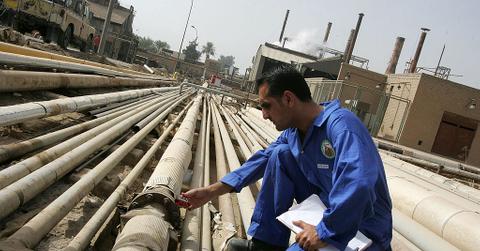The Five Best-Paying Jobs in Oil and Gas Production
Working in oil and gas production can be lucrative, whether you're in an entry-level or management position. Here are the best-paying jobs in the sector.
July 22 2022, Published 9:18 a.m. ET

Working in oil and gas production can be lucrative, whether you're in an entry-level or management position. What are the best-paying jobs in the sector? What qualifications do you need?
The world may be shifting from fossil fuels to renewable solar and wind energy, but economies are going to depend on oil for the foreseeable future—Qatar’s $30 billion gas production project, supported by Shell, TotalEnergies, and ExxonMobil, is just our latest reminder of that.
Is it a good idea to work in oilfields?
Whereas demand for petroleum products is growing, the industry is heavily derided by environmental groups. In many places, it has become difficult for oil companies to obtain permits to start new drilling projects and upgrade existing facilities. Working in the sector could be especially difficult if you're climate-conscious. However, the oil and gas sector does have stable and well-paying jobs, and oil is needed in any economic environment.

What are the best-paying jobs oil and gas production?
The oil and gas industry is vast and employs professionals from a variety of disciplines. Oil companies are also usually highly profitable, meaning they can offer competitive compensation to attract people with valuable skills. Some of the best-paying oilfield jobs are as follows:
Petroleum geologist.
Petroleum engineer.
Drilling engineer.
Gas-plant operator.
Economist.
Petroleum geologists' salary ranges from $97,000 to $120,000
Geologists are in high demand in oilfields, where they identify drilling locations and inform other oil extraction strategies. You’ll need at least a bachelor’s degree to land a well-paid petroleum geologist position with a salary of $97,000 to $120,000. Professionals with more experience and qualifications can make more than $200,000.
Petroleum engineers' average salary is above $120,000
In the oilfield, petroleum engineers are tasked with designing efficient and effective oil wells. They earn an average salary of $120,000, with more experience and qualifications offering higher pay.
Drilling engineers can take home over $130,000
Drilling engineers oversee the drilling of oil wells, through which oil and gas are pumped from the ground. You’ll need at least a bachelor’s degree in engineering, and the median salary is around $130,000.
Gas-plant operators need experience in the field
As a gas-plant operator, you’ll be in charge of operating the systems that distribute and process gas to bring it to a form that consumers can use. Gas-plant operators may not need a degree but should have practical experience. The average salary for gas-plant operators is about $70,000.
Economists help with investment and pricing decisions
Oil and gas companies need economists, who are among the highest-paid professionals in the industry. The salary for energy economists ranges from $52,000 to $187,000. These professionals help companies make investment, production, and pricing decisions.
